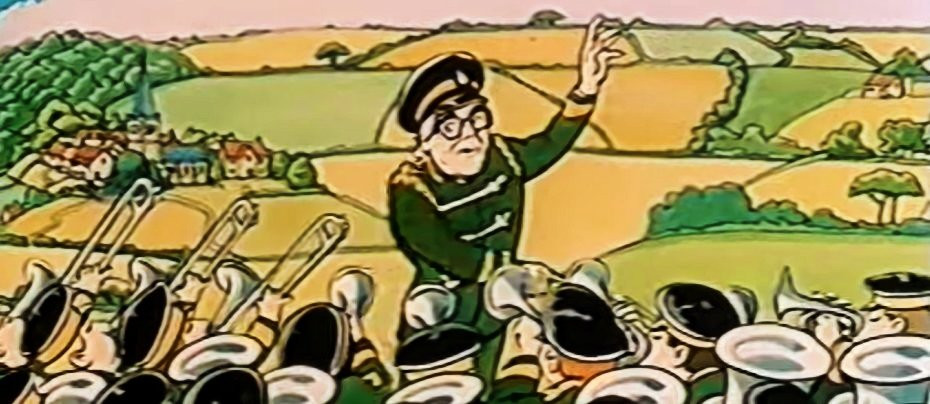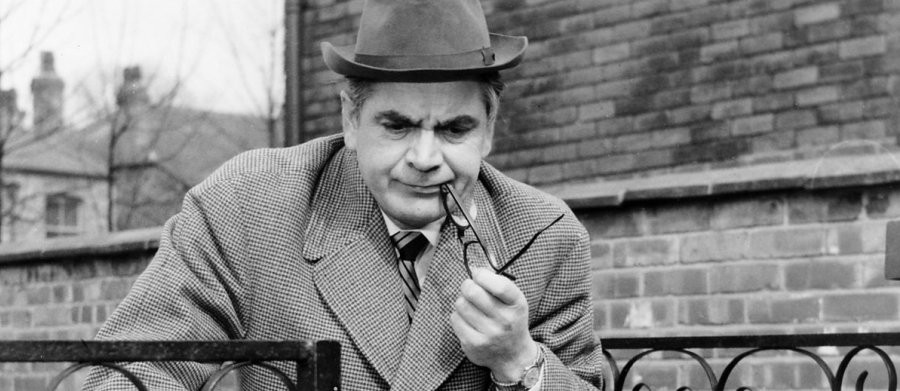
Harry Worth
One would think history would be kind to somebody who headlined their own sitcom for 15 years, was personally endorsed by Laurel and Hardy and counted Morecambe and Wise among their biggest fans. And yet despite this surely unique combination, the bewildered and bewildering character created by Harry Worth is cruelly unheralded in reflections of stars of yesteryear.
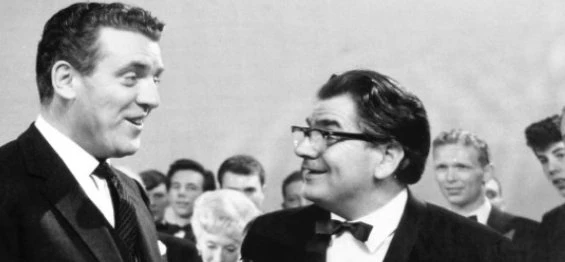
Born in 1917 near Barnsley, Harry Illingsworth (the Illings was dropped for a greater stage impact) was, like many of his peers, not born into a showbiz family. His keenness to be on stage stemmed back to his school days, determining to be a ventriloquist after a visit to his school by just such a performer. He worked down the mines from the age of just 14, but continued to try out his comedic talents, even taking his ventriloquist dummy with him when the RAF came calling for national duty, spending six years in service and appearing in a Gang Show in India.
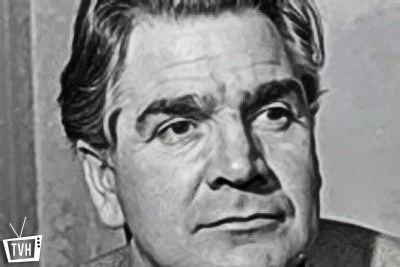
After the war, Worth focussed on his act and in 1947, married his sweetheart Kay Flynn, who convinced him to try an audition in London for renowned Windmill Theatre owner Vivian Van Damm, a shrewd move that set him on his way despite Van Damm allegedly not laughing at his act once before booking him. Worth’s most significant success, however, was joining the supporting cast of one of Laurel and Hardy’s UK tours of the early 1950s. Appearing on the same bill as the Hollywood legends, it was Oliver in particular who showed an interest in Harry’s fledgling career, and when Ollie suggested that he focus on his comedy and ditch the ventriloquist dummy, he naturally took the advice. So enamoured were the boys by Worth that on their next tour, they requested Harry be on the bill once again.

For the rest of the 1950s Harry worked in radio and collected bit parts on stage and screen, but in 1960, the same year he made his Royal Variety Show debut, BBC North offered him a shot at stardom. His debut show, The Trouble with Harry, introduced the nation to a bumbling and bewildered character. Worth played an author seeking publishing success but seemingly without much of a chance. His main companion was Tiddles the cat, along with his Aunt who was regularly referenced but never seen. The show had the backing of producer John Ammonds, who would of course be a huge part of Morecambe and Wise’s finest work, and his Midas touch helped this first series work well enough for further shows to be commissioned.
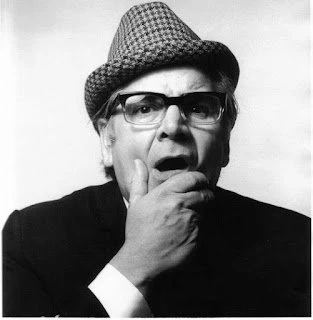
The author storyline was disposed of for the second series as the programme changed its name to Here’s Harry, and from then on Harry Worth became a regular on the nation’s small screens. The character was a baffled one, well-meaning and mild mannered, but causing confusion and frustration wherever he went. He invariably found himself up against officials or authority figures whose jobs became that much tougher due to Harry’s requests. Of the creation of Worth’s persona, Ernie Wise remarked, ‘nervousness, worked at, rehearsed and perfected, was the essence of his act.’
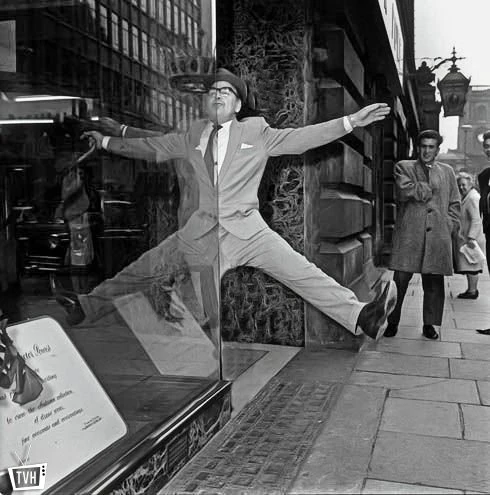
The programme went from strength to strength, and in 1966, although keeping the format the same, the show was rebranded to simply Harry Worth, a nod to the star power that followed Harry. At the same time as his television career was thriving, he was touring also under the stage show name of Here’s Harry. Seemingly he was unstoppable. People the nation over were trying the trick of standing one half visible at the end of a reflective store window, raising an arm and a leg to give the impression of levitating, allegedly a trick devised by writer Vince Powell. Powell himself was among the writers for Here’s Harry his first steps of a glowing writing career that gave us such successes as Nearest and Dearest, Bless This House and Never the Twain, among a host of other notable programmes.
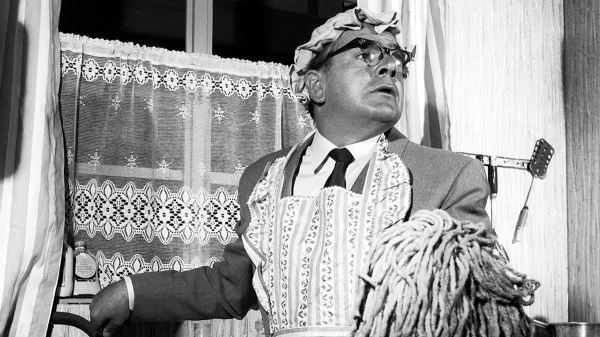
Harry Worth ended in 1970, but Harry himself continued to work regularly, turning to commercial television for further success with Thirty Minutes Worth and My Name is Harry Worth all the while continuing with the persona of the bumbling, good natured fool causing chaos wherever he went. He once said, ‘Other people can do the most embarrassing things – and they get loads of sympathy. But if I do anything like that, people scream with laughter!’
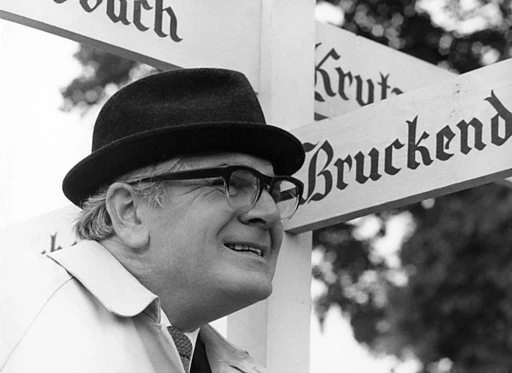
Eventually though, comedy moved on, and Harry got lost somewhere in the process. After My Name is Harry Worth ended in 1974, aside from a recurring guest role in How’s Your Father?, Worth would only have one more starring role on television, but it didn’t go to plan. In 1980, sitcom legend David Croft and writing partner Jeremy Lloyd called upon Harry to play Mr Beddington in their latest sitcom, Oh Happy Band! Beddington was the conductor of a village brass band that was leading efforts to resist the building of a new airfield destined to destroy their homes. The problem was that the part had been specifically written for Gorden Kaye, who would so successfully resist the Germans in ‘Allo, ‘Allo. Strikes at ITV meant Kaye’s schedule changed and he could no longer commit to a series if the pilot was a success. Beddington had been written as a rather devious character amongst a collection of bewildered idiots. Having made his career playing the well-meaning idiot, asking Harry to be a more cunning and cynical character completely went against type. Croft and Lloyd tried transferring the more deviant elements of the lead character to another, leaving Harry to portray the kind of person that he always had done, but somehow it didn’t work out. It was a most unusual comedy in as much as the BBC gave the green light for a second series, but Croft and Lloyd decided against it, and the show has been almost completely hidden from view since its first transmission.
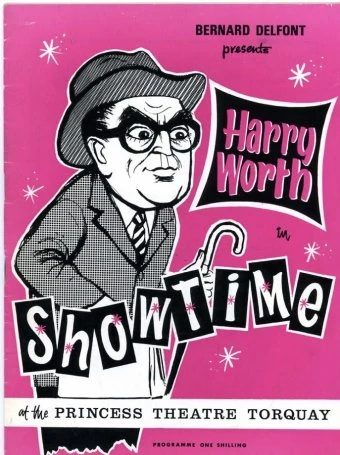
Harry would not appear on TV again, but continued working on stage, appearing with his old ventriloquist act again on the Royal Variety Show, and touring briefly in 1987 in See How They Run, before illness started to take its toll. After a lengthy cancer battle, Harry Worth passed away in 1989.
There’s no doubting that to continue with essentially one on-screen persona is a risky business for a comedy performer, but Harry Worth was a glorious success as the bumbling idiot. Part Frank Spencer, part David Jason in his Sharp Intake of Breath days, and even with an element of Victor Meldrew, there are plenty of subsequent characters that owe a nod to Worth. Perhaps the success of One Foot in the Grave shows how the changing styles of comedy have kept Worth from having his due recognition as while he and Victor fought similar battles, Meldrew had by far a more combative approach than the mere well-meaning confusion that Harry brought.
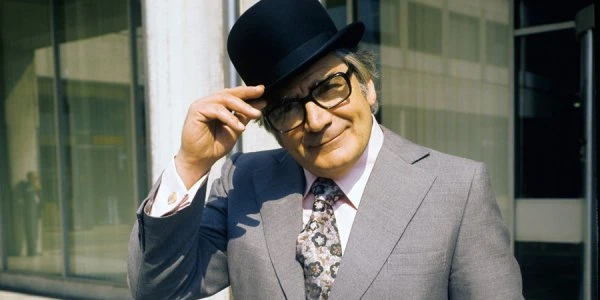
It’s a shame that Worth is not normally given his dues when reflecting on comedy greats. Without repeats of his shows he is almost a forgotten man of comedy, despite the massive success and respect he garnered. To paraphrase a catchphrase that was often attributed to him, ‘…I don’t know why, but there it is.’
Bio by Brian Slade:
Born and raised in Dorset, Brian Slade turned his back on a twenty-five-year career in IT in order to satisfy his writing passions. After success with magazine articles and smaller biographical pieces, he published his first full-length work, `Simon Cadell: The Authorised Biography'.
Brian is a devoted fan of the comedy stars of yesteryear, citing Eric Morecambe, Ken Dodd, Harpo Marx and Dudley Moore amongst his personal favourites. He was drawn to the story of Simon Cadell through not only `Hi-de-hi!' but also `Life Without George', a programme he identified with having grown up in the Thatcher era.
Published on August 15th, 2021. Written by Brian Slade for Television Heaven.




